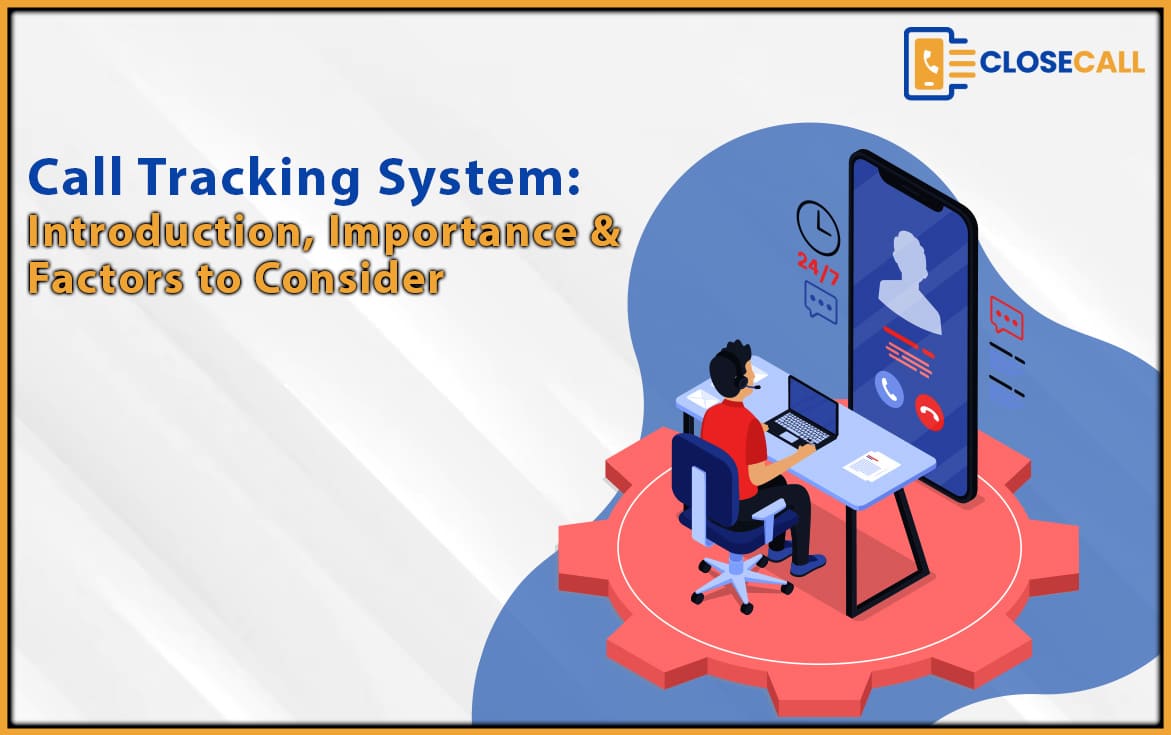In today’s digital landscape, the call tracking system has evolved into a vital instrument for businesses. With the rapid advancement of technology, companies now have access to highly efficient and user-friendly call-tracking solutions that have made it easier than ever to monitor and analyse incoming calls. Its importance cannot be underrated, as it provides businesses with valuable insights into their marketing efforts, customer interactions, and overall performance. Selecting the perfect one requires careful consideration of various factors, which we will discuss later in the article. With the right call tracking system in place, businesses can enhance customer experiences, increase sales, and achieve overall success in a competitive marketplace.
Call Tracking System: An Introduction
A call tracking system is a powerful tool that enables businesses to monitor and analyze their incoming phone calls. It functions by assigning unique phone numbers to different marketing campaigns or channels, allowing companies to track which campaigns render the most calls and conversions. This system records valuable data such as the caller’s phone number, call duration, call source, and even the keywords that led to the call. By collecting this information, businesses gain insights into the effectiveness of their marketing efforts, permitting them to make data-driven findings in order to optimize their strategies.
In addition to tracking marketing campaigns, it also offers features that help enhance customer service and improve overall business operations. They enable call recording, which allows businesses to review and analyze calls for quality assurance, training purposes, and customer dispute resolution. Call tracking systems can also integrate with customer relationship management[1] (CRM) software, enabling seamless data transfer and furnishing a holistic view of customer interactions across multiple channels. Moreover, advanced analytics and reporting tools provided by these systems offer detailed insights into call volumes, peak call times, call outcomes, and caller demographics, empowering businesses to make informed decisions and improve customer experiences. Overall, it serves as a comprehensive solution for businesses to gain valuable insights, optimize marketing strategies, and enhance customer service.
Importance
Implementing a call tracking system offers several important benefits for businesses. Here are six key reasons why implementing it is crucial:

- Monitor Marketing Effectiveness: A call tracking system allows businesses to allot phone calls to specific marketing campaigns, channels, or keywords. By understanding which campaigns generate the most calls and conversions, businesses can optimize their marketing strategies and allocate resources effectively.
- Helps Calculate ROI: With the help of the small monitoring tool, businesses can accurately gauge the return on investment (ROI) of their marketing efforts. By tracking the no. of calls generated from each campaign and comparing it to the associated costs, businesses can determine the effectiveness of their marketing expenses.
- Improve Services: Call tracking systems often include recording and monitoring features. It enables businesses to review and analyse customer calls for quality assurance, identify areas for improvement, and provide targeted training to customer service representatives, leading to enhanced customer satisfaction.
- Calculate Marketing Expenditure: By tracking which advertising channels or campaigns generate the most calls and conversions, businesses can optimize their advertising expenditure. They can allocate resources to the most effective channels and eliminate or modify underperforming ones, maximizing their advertising budget.
- Understand Customer Behaviour: Call tracking systems provide valuable data about caller demographics, call durations, call outcomes, and more. By analysing this data, businesses can gain insights into customer behaviour, preferences, and needs, allowing them to tailor their products, services, and marketing strategies accordingly.
- Improve Conversion and Sales Rates: With the help of a monitoring system, businesses can identify high-performing sales and marketing tactics. By understanding which strategies lead to more phone calls and conversions, businesses can focus on replicating those successful approaches, resulting in increased sales and higher conversion rates.
Overall, implementing a call tracking system empowers businesses with valuable data, insights, and tools to optimize their marketing efforts, improve customer service, and drive business growth.
How Implementing a Call Tracking System Can Affect Our Business?
Implementing a perfect call tracking system can have a significant positive impact on a business. It enables businesses to accurately measure the effectiveness of their marketing campaigns, optimize their advertising spend, and make data-driven decisions to enhance customer service and overall operations. It provides valuable insights, such as caller demographics, call outcomes, and customer behaviour, empowering businesses to tailor their strategies and offerings to meet customer needs. On the other hand, a poorly implemented or bad call-tracking system can have detrimental effects on a business. It can lead to inaccurate data, missed opportunities, and poor customer experiences. Inaccurate data may result in misguided marketing decisions and wasted resources.
Moreover, a bad call tracking system may lack essential features like call recording, real-time tracking, or integration capabilities, hindering businesses from gaining valuable insights and providing optimal customer service. Therefore, selecting and implementing the right monitoring mechanism is crucial to ensure its positive impact on a business while avoiding the pitfalls of bad implementation.
Factors to Consider While Implementing a Call Tracking System
Certainly! When implementing a call tracking system, it’s important to consider the following ten factors to ensure a successful integration:

- Consider Business Objectives: Clearly define your business objectives and goals for implementing a call tracking system. Determine what specific outcomes you want to achieve, such as measuring marketing ROI, optimizing advertising campaigns, improving customer service, or enhancing sales.
- Functional compatibility: Evaluate how well the call tracking system integrates with your existing technology structure. Also, consider the compatibility rate with your customer relationship management system, website, marketing tools, and analytics platforms. Seamless integration ensures smooth data transfer and a unified view of customer interactions.
- Tracking Functions: Assess the tracking capabilities of the system. Look for features like dynamic number insertion, which assigns unique phone numbers to different marketing campaigns. Other capabilities may include keyword-level tracking, call recording, call routing, advanced call analytics, and multi-channel attribution. Choose a system that offers the specific functions you need to gain valuable insights.
- Versatility: Consider the versatility of the call tracking system. It should be able to handle your current call volumes and accommodate future growth as your business expands. Ensure that the system can handle increased call traffic without sacrificing accuracy, performance, or experiencing downtime.
- Report And Analytic Features: Look for robust reporting and analytics features within the call tracking system. It should provide comprehensive insights into call volumes, call durations, caller demographics, conversion rates, call outcomes, and other relevant metrics. Customizable reports, real-time dashboards, and drill-down capabilities enable effective analysis and data-driven decision-making.
- Privacy Policy: Ensure the call tracking system complies with privacy regulations and data protection laws. Evaluate the system’s security measures, data encryption protocols, and adherence to industry-specific compliance requirements. Protecting customer data is paramount to maintaining trust and avoiding legal issues.
- Simple and Easy-to-use: Consider the user-friendliness of the call tracking system. It should have an intuitive interface, a simple setup process, and easy-to-use features. A system like this allows your team to quickly adapt to and understand its functions, minimizing the learning curve and maximizing productivity.
- Customer Support and Training: Evaluate the level of customer support and training provided by the call tracking system provider. Check if they offer resources such as documentation, tutorials, video guides, and responsive customer support. Robust support and training will assist you during implementation, provide ongoing assistance, and ensure a smooth and successful integration.
- Cost-effective: Consider the cost of the monitoring tool in relation to the value it provides to your business. Evaluate pricing models, such as monthly subscriptions or per-call pricing, and compare them with the features, functionalities, and benefits offered by the system. Determine the return on investment (ROI) potential and assess whether the system aligns with your budget and long-term business goals.
- Customization: Assess the system’s customization and flexibility options. Look for the ability to customize call flows, notifications, and integrations to align with your specific business needs. A flexible system allows you to tailor it to your unique requirements and adapt to changing business demands.
Considering these ten factors in detail will help you select a call tracking system that aligns with your business objectives, seamlessly blend with your IT system, provide comprehensive tracking capabilities, ensures compliance, offers a user-friendly experience, delivers value, and can be customized to meet your specific needs. Reach out to our Closecall team to experience the best call tracking system and smart business call monitoring software developed over the course of the last decade.
Conclusion
Selecting the perfect call tracking system is a critical decision for businesses aiming to optimize their marketing efforts, improve customer service, and make data-driven decisions. By considering these factors, businesses can identify a call tracking system that aligns with their specific needs. The right method will provide accurate tracking, comprehensive insights, seamless integration, user-friendly features, and the ability to adapt to future growth. It will also ensure compliance with privacy regulations and offer reliable customer support. By making an informed choice, businesses can unlock the full potential of their call tracking system, driving growth, enhancing customer experiences, and gaining a competitive edge in the marketplace.
Read our Article:How to Track Employee Call Logs Effortlessly in 2023?



